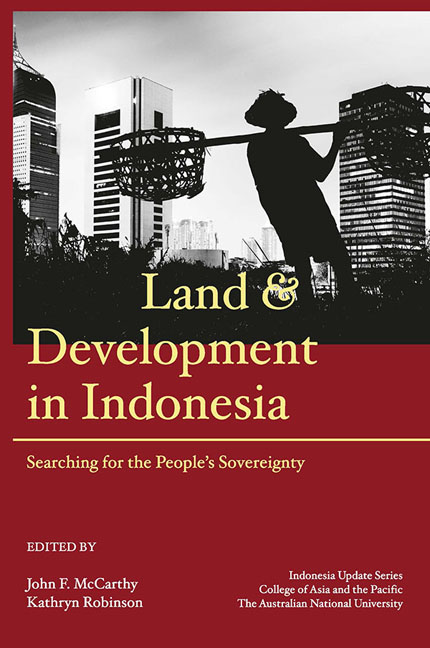Book contents
- Frontmatter
- Contents
- Tables
- Figures
- Contributors
- Acknowledgements
- Glossary
- Map
- 1 Land, economic development, social justice and environmental management in Indonesia: the search for the people's sovereignty
- PART 1 LAND USE AND LAND LAW: THE BIG PICTURE
- 2 The plantation and the mine: agrarian transformation and the remaking of land and smallholders in Indonesia
- 3 Indonesian land law: integration at last? And for whom?
- PART 2 ENVIRONMENTAL AND CUSTOMARY FRAMING OF LAND TENURE
- PART 3 URBAN AND INFRASTRUCTURE DEVELOPMENT
- PART 4 AGRICULTURE, LAND TENURE AND LIVELIHOODS
- PART 5 LARGE-SCALE LAND ACQUISITIONS AND SMALLHOLDER DEVELOPMENT
- Index
- Miscellaneous Endmatter
3 - Indonesian land law: integration at last? And for whom?
from PART 1 - LAND USE AND LAND LAW: THE BIG PICTURE
Published online by Cambridge University Press: 29 July 2017
- Frontmatter
- Contents
- Tables
- Figures
- Contributors
- Acknowledgements
- Glossary
- Map
- 1 Land, economic development, social justice and environmental management in Indonesia: the search for the people's sovereignty
- PART 1 LAND USE AND LAND LAW: THE BIG PICTURE
- 2 The plantation and the mine: agrarian transformation and the remaking of land and smallholders in Indonesia
- 3 Indonesian land law: integration at last? And for whom?
- PART 2 ENVIRONMENTAL AND CUSTOMARY FRAMING OF LAND TENURE
- PART 3 URBAN AND INFRASTRUCTURE DEVELOPMENT
- PART 4 AGRICULTURE, LAND TENURE AND LIVELIHOODS
- PART 5 LARGE-SCALE LAND ACQUISITIONS AND SMALLHOLDER DEVELOPMENT
- Index
- Miscellaneous Endmatter
Summary
As in most developing countries, land tenure relations in Indonesia are contentious. The many transitions involving land use—from agriculture to industry, from rural villages to urban neighbourhoods, from subsistence farming to plantations—exert heavy pressure on social relations. The contributions to this volume provide vivid accounts of this; whether they concern infrastructure development, housing, oil palm regimes, agricultural change or mining, they demonstrate that changes to land use are often accompanied by conflict, violence, forced migration and other types of misery. While in the past many areas still knew a frontier that could act as a safety valve, today in many regions the limits of usable land have been reached and this route of escape has been closed off (Li 2010).
In all land disputes, law is in some way a focus of contention. This may be about legal interpretation within the parameters set by the law, or about achieving legal change in order to create more favourable conditions for particular groups of citizens. Legal interpretation is central to negotiations between parties to a conflict, in court judgments or in forums of complaint such as the National Commission for Human Rights or the Ombudsman. Achieving legal change concerns legislative processes at different levels, but also the promotion of novel judicial interpretation. For many years the Indonesian judiciary hardly played a role in legal evolution, as it lacked the institutional devices to turn legal interpretation in single cases into a judicial doctrine (Pompe 2005; Bedner 2013). However, the establishment of Indonesia's Constitutional Court in 2003 in combination with the accessibility and acceptance of legal sources of international and transnational origin has changed this.
How Indonesia's legal system is coping with the current pressures and how it influences land disputes are important matters. The key question for lawyers is whether the system provides a coherent framework for authoritative resolution of land disputes. According to most of the literature, the answer to this question is ‘no’. Little of what has been written about Indonesian land law is positive or hopeful—in that respect not much has changed from colonial times to the present (see Chapter 10 by van der Eng). Land law has been called complex, inconsistent, fragmented, unfair and out of touch with reality (Lindsey 1998; Fitzpatrick 2006; Daryono 2010; Srinivas et al. 2015), and international donors have called for ‘a comprehensive overhaul’ (USAID n.d.: 1).
- Type
- Chapter
- Information
- Land and Development in IndonesiaSearching for the People's Sovereignty, pp. 63 - 88Publisher: ISEAS–Yusof Ishak InstitutePrint publication year: 2016

